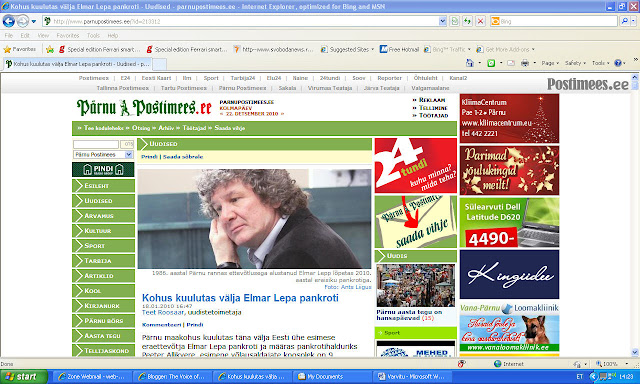WHAT'S GOING ON!? Don't laws apply to banks in Estonia any more!!??
Although OÜ Grove Invest won in court against its former partner SEB Group and the court ordered the bank to pay litigation costs in favour of the company, the bank still hasn't paid up.
Chairman of the Supervisory Board of Grove Invest OÜ Natalia Levina told Äripäev's Russian sister publication Delovye Vedomosti that the conflict between SEB and Grove Invest started when the equipment purchased for Kohila Plywood Factory with leasing broke soon after acquisition. ‘The equipment belonged to SEB Leasing. The factory was not working, but we had to continue making lease payments, repay our bank loans, pay salaries to staff and taxes. Eventually we ran out of money, but the equipment still wasn't working. We had to declare that Baltic Panel Group OÜ was bankrupt,’ said Levina.
In 2008 SEB filed a bankruptcy petition against Gove Invest.
Levina: The bank chose the cheapest option
Levina believes that the bank filed a bankruptcy petition against Grove Invest, because the state fee payable for filing such a petition is very low in Estonia. ‘I think the option chosen by the bank was not the cleanest, but it was certainly the cheapest,’ she added. In her opinion, the bank wanted to use the bankruptcy petition to force Grove Invest into a transaction that was harmful for the company. ‘We have our correspondence with SEB, where they filed for our bankruptcy and at the same time, they offered us the option to buy out the bank's claim against the factory for 150 million kroons. We agreed to pay 100 millions. Where's the logic in this? If I have this much money to pay, it means I cannot be bankrupt,’ said Levina.
SEB is convinced that there is nothing out of the ordinary in the way the bank and the leasing company conducted themselves with Baltic Panel Group and Grove Invest. ‘SEB went to court, because Grove Invest did not perform its obligations. Grove Invest countersued, accusing SEB of causing the bankruptcy of Baltic Panel Group,’ said SEB Bank's Communications Manager Silver Vohu.
Levina says that SEB Leasing as the owner of the equipment should have taken responsibility for what happened. ‘They didn't allow us to repair the equipment and they didn't do it themselves either,’ she said.
Defence lawyer of Grove Invest: The bank is ignoring its obligations
Attorney-at-law Elmer Muna from law firm Tark & Co, who defended Grove Invest, claims that the bank is ignoring its obligations. ‘The amount of the legal costs is peanuts for SEB Bank (64,900 kroons) and paying them would not be a problem. The court judgement obviously means nothing to the bank, especially as it was not made in their favour,’ said Muna.
He added that they filed an execution petition with a bailiff. ‘The bank has to pay the legal costs as well as for the services of the bailiff,’ added the attorney.
Former director: SEB is a lousy owner
The former CEO of Baltic Panel Group Tiit Tammsaar believes that the negative consequences and mass redundancies could have been avoided if the bank had been more accommodating with the company.
‘I can say that SEB is not the best owner. Irrespective of whether or not the bank is guilty, I am convinced that they saw themselves as the stronger side and acted accordingly. It is clear that they're the biggest owners, the money is theirs and they can do whatever they want,’ he said.
Number: The court ordered the SEB Group to pay 64,000 kroons in legal costs in favour of Grove Invest.
Comments
Silver Vohu
By law, we are obliged to not disclose information subject to banking secrecy, which means we are unable to discuss the financial issues of a client in public and the bank can only present its counterclaims in court. However, we can confirm that the accusations made by Grove Invest are unfounded and the bank is ready to defend its rights in court.
We believe that both the bank and the leasing company have conducted themselves with Grove Invest as can ordinarily be expected and in good faith, and both have performed the contracts they entered into. SEB will naturally do as the court ruled when it decided not to declare Grove Invest bankrupt and pay the procedure expenses in the amount determined by the court.
Inna Rak, Äripäev 19.07.2010
















